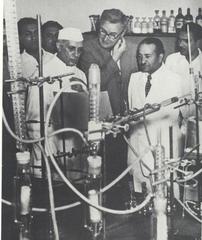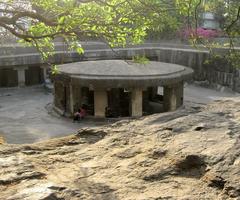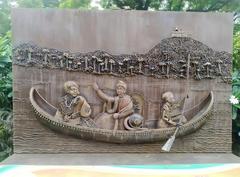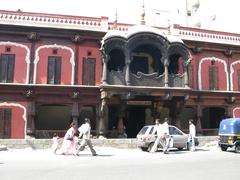Gokhale Institute of Politics and Economics Pune: Visiting Hours, Tickets, and Historical Significance
Date: 04/07/2025
Introduction
Nestled in Pune’s vibrant Deccan Gymkhana area, the Gokhale Institute of Politics and Economics (GIPE) stands as a distinguished center for research, learning, and historical heritage in India. Established in 1930 under the guidance of Rao Bahadur R. R. Kale and the Servants of India Society (inspired by Gopal Krishna Gokhale), GIPE is one of India’s oldest and most respected institutions dedicated to economics and political science (GIPE Official History; Wikipedia). The campus, renowned for its blend of colonial-era and modern architecture, is also home to heritage landmarks such as Gokhale’s bungalow and the iconic banyan tree where Gokhale and Mahatma Gandhi held historic dialogues.
This comprehensive guide details GIPE’s founding legacy, academic evolution, campus features, visiting information, and tips for making the most of your visit to one of Pune’s most storied institutions.
Table of Contents
- Historical Background
- Academic Evolution and Recognition
- Research and National Impact
- Academic Programs and Publications
- Campus and Architectural Heritage
- Visiting Information
- Visitor Amenities and Tips
- Nearby Attractions
- Frequently Asked Questions (FAQ)
- Conclusion
- References
Historical Background
Founding and Early Years
GIPE was established on June 6, 1930, as a pioneering research and training institute in economics (Wikipedia). Founded through the efforts of Rao Bahadur R. R. Kale and under the trusteeship of the Servants of India Society, GIPE’s mission was to advance economic and political research in pre-independence India (GIPE Official History). The institute’s first director, D. R. Gadgil, set rigorous academic standards focused on addressing India’s socio-economic challenges.
Gopal Krishna Gokhale and the Servants of India Society
Named after Gopal Krishna Gokhale (1866–1915)—a noted nationalist leader and mentor to Mahatma Gandhi—GIPE reflects his vision of empowering Indians through quality education for self-governance and nation-building (GIPE About Us). The Servants of India Society, founded by Gokhale in 1905, became GIPE’s trustee and was dedicated to public service. The campus houses a commemorative column atop Hanuman Tekdi hill, marking the site where Gokhale took his vows for public service (Wikipedia).
Academic Evolution and Recognition
From 1930 to 1949, GIPE awarded degrees under the University of Bombay, and then under the University of Pune until 1993. That year, GIPE was declared a ‘Deemed University’ by the Government of India, enabling greater autonomy in academic and research pursuits (GIPE Official History; Wikipedia).
Research and National Impact
GIPE’s empirical research has shaped economic policy in Maharashtra and across India. Recognized as a Centre of Advanced Study by the UGC in Agricultural Economics (1962) and Economics (1964), and hosting the Reserve Bank of India Chair in Finance, GIPE continues to contribute significantly to economic thought and public policy (GIPE About Us; Wikipedia).
Academic Programs and Publications
GIPE offers MSc and PhD programs in economics, known for their robust curricula blending theoretical and applied economics (Wikipedia). Its quarterly journal, Artha Vijnana, has been a leading platform for economic research since 1959. The annual Kale Memorial Lecture series, featuring eminent economists and policymakers, is a highlight for both students and visitors.
Campus and Architectural Heritage
Academic Campus
The academic campus, set amid lush lawns and mature trees, features a harmonious mix of heritage and modern buildings. Key facilities include:
- Dhananjayarao Gadgil Library: One of India’s largest social science libraries, blending colonial and contemporary design, and offering digital access to vast collections (GIPE Library).
- Kale Memorial Hall and Seminar Halls: Equipped with advanced audio-visual systems and hosting academic events and public lectures (GIPE Infrastructure).
- Gokhale’s Bungalow: The preserved colonial-era residence of Gopal Krishna Gokhale, famously shaded by a banyan tree where he and Gandhi met (GIPE Infrastructure).
Residential Campus
Located about 500 meters from the academic zone, the residential campus spans five acres and includes hostels for students (including two for female students), staff quarters, and a guest house for visiting scholars (GIPE Infrastructure).
Architectural Highlights
- Heritage Structures: Gokhale’s Bungalow represents early 20th-century colonial architecture with wide verandas and period woodwork.
- Modern Facilities: Buildings like the girls’ hostel (designed by C. C. Benninger) and the library exemplify sustainable, functional design (GIPE Library).
- Green Spaces: The scenic Hanuman Tekdi hill and manicured lawns foster a peaceful academic environment (GIPE Infrastructure).
Visiting Information
Hours, Tickets, and Entry
- Visiting Hours: Monday to Saturday, 9:00 AM – 5:00 PM. Closed Sundays and public holidays.
- Entry Fee: Entry to the campus and heritage sites is free. All visitors must obtain a visitor pass at the main gate.
Accessibility
GIPE’s campus is accessible by public transport, taxi, and private vehicle. Key areas have ramps and paved walkways for wheelchair users, and restrooms are accessible (GIPE Infrastructure).
Guided Tours and Events
Guided tours highlighting GIPE’s history and architecture can be arranged by prior request. Visitors may also attend public lectures and academic events—check the official GIPE website for schedules.
Getting There
GIPE is located at #846 Shivajinagar, BMCC Road, Deccan Gymkhana, Pune. The campus is approximately 1.27 km from Pune Junction railway station.
Visitor Amenities and Tips
- Guest House: Rooms for official guests and researchers may be booked via [email protected].
- Library Access: Public memberships are available for research purposes.
- Photography: Permitted in most areas; drone or commercial photography requires prior approval.
- Event Participation: Visiting during events like the Kale Memorial Lectures or Spirit Week is highly recommended for an immersive experience.
Nearby Attractions
GIPE’s central location makes it convenient to visit other Pune landmarks, including:
- Fergusson College
- Pataleshwar Cave Temple
- Shaniwar Wada
- Dagdusheth Halwai Ganapati Temple
- Aga Khan Palace (Aga Khan Palace Pune Official Website)
Frequently Asked Questions (FAQ)
Q: What are GIPE’s visiting hours?
A: Monday to Saturday, 9:00 AM to 5:00 PM; closed Sundays and public holidays.
Q: Is there an entry fee?
A: No, entry is free for visitors.
Q: Are guided tours available?
A: Yes, by prior arrangement with the administration.
Q: Is the campus wheelchair accessible?
A: Yes, ramps and paved pathways are provided.
Q: Can the public access the library?
A: Yes, through public membership for research.
Q: How to reach GIPE?
A: Located in Deccan Gymkhana, accessible by public transport, taxi, or private vehicle.
Conclusion
The Gokhale Institute of Politics and Economics is a unique confluence of academic excellence, historical legacy, and serene campus life. Whether you’re interested in exploring India’s economic and political history, attending lectures, or enjoying the tranquil campus, GIPE offers a memorable experience for all visitors. Plan your visit to discover the enduring impact of Gopal Krishna Gokhale’s vision on India’s academic and public spheres.
For updates on hours, events, and tours, visit the official GIPE website and follow their social media for the latest news.
References and Further Reading
- GIPE Official History
- GIPE Infrastructure
- GIPE About Us
- GIPE Library Information
- Wikipedia
- Aga Khan Palace Pune Official Website
- GIPE Admissions
- SearchURCollege
- UniversityKart
- Yappe.in Review
- GIPE Students Corner
- GIPE Artha Vijnana




